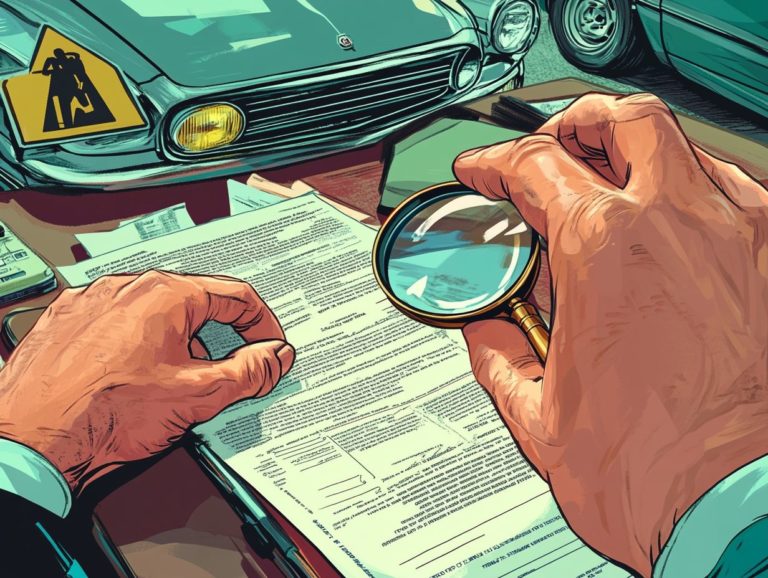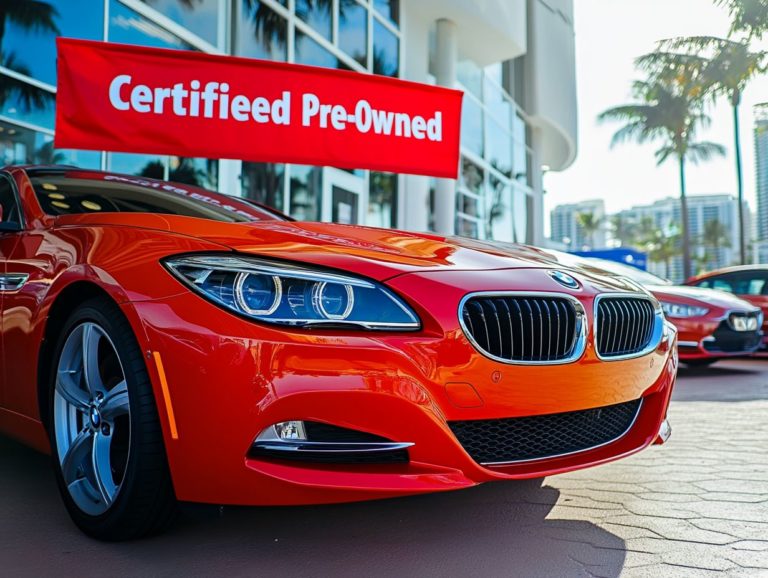Top 10 Questions to Ask Your Dealer About Financing
Navigating the world of vehicle financing can feel overwhelming, but asking the right questions can truly make a difference.
Here are the top 10 questions you should pose to your dealer to ensure you fully grasp your financing options. From interest rates and down payments to special promotions, this guide covers everything you need to make an informed decision.
Whether you re a first-time buyer or considering refinancing, you will be empowered to secure the best deal possible.
Get ready to take charge of your financing journey now!
Contents
- Key Takeaways:
- 1. What Are the Different Financing Options Available?
- 2. What Is the Interest Rate for Each Option?
- 3. Are There Any Special Promotions or Deals for Financing?
- 4. What Is the Required Down Payment for Each Option?
- 5. How Long Is the Financing Term?
- 6. Are There Any Penalties for Early Repayment?
- 7. Can I Get Pre-Approved for Financing?
- 8. What Documents Do I Need to Provide for Financing?
- 9. Are There Any Additional Fees or Charges for Financing?
- 10. How Does My Credit Score Affect My Financing Options?
- What Are the Benefits of Financing Through the Dealer?
- Frequently Asked Questions
- 1. What are the different financing options available to me?
- 2. What is the interest rate for the financing option I am interested in?
- 3. Are there any hidden fees or charges associated with the financing?
- 4. Can I negotiate the terms of my financing?
- 5. Is there a penalty for paying off my loan early?
- 6. Is there a warranty or protection plan included with the financing?
Key Takeaways:

- Explore different financing options and their interest rates to find the best fit for your budget.
- Ask about special promotions or deals to potentially save money on your financing.
- Understand the required down payment and financing term for each option.
1. What Are the Different Financing Options Available?
When you’re considering a car purchase, grasping the various financing options available is essential. These options can vary widely depending on the dealer, whether you’re eyeing a used car or an electric vehicle, and the specific terms offered by lenders like Capital One or assessed through resources like Bankrate.
You have several avenues to explore. Traditional loans from banks or credit unions might provide competitive interest rates. In contrast, dealership financing often flaunts appealing promotional offers. If you’re leaning towards electric vehicles, you might benefit from special incentives or rebates that enhance financing terms. Certified Pre-Owned cars, on the other hand, come with their own set of advantages.
It’s vital to compare rates and terms carefully. Even minor differences can lead to significant savings over time.
Understanding the total cost of owning the vehicle is also vital. This includes factors like insurance and maintenance when you’re selecting the right financing option.
2. What Is the Interest Rate for Each Option?
The interest rate for each financing option can significantly influence your monthly payments and the total cost of your car purchase. You need to compare rates, considering your vehicle’s history and any trade-in value you might have.
Your credit score plays a pivotal role in determining the interest rates lenders are willing to offer. A higher credit score often means lower rates, translating into potential savings over the life of the loan.
The type of loan you choose whether a traditional auto loan or a lease will also impact these rates. Different financing structures carry varying risks for lenders.
Understanding this entire landscape is vital. That’s why you should shop around and scrutinize multiple offers to find the one that best aligns with your financial situation.
3. Are There Any Special Promotions or Deals for Financing?
Many dealerships present special promotions or rebate incentives designed to attract buyers. These offers make financing options more appealing and affordable often bundled with manufacturer warranties as part of the deal.
These promotions typically feature enticing low-interest rates, which can significantly reduce your monthly payments. They may also include cash rebates that offer immediate savings on the vehicle’s purchase price.
To discover these offers, explore dealership websites, subscribe to their newsletters, or delve into automotive forums where current promotions are actively discussed. These incentives enhance your overall financing terms and help you make informed, financially sound decisions, ultimately maximizing your investment in a new vehicle.
4. What Is the Required Down Payment for Each Option?
The required down payment for financing options varies considerably. It can greatly influence your monthly payments and the overall cost of your car purchase, including additional costs that may be added by the dealership.
Generally, making a larger down payment can significantly reduce your monthly payments, making the purchase more manageable over time. Typically, down payments fall within the range of 10% to 20% of the vehicle’s price, though this can depend on the lender s requirements and your credit score.
With various financing options available such as traditional loans, leasing, or specialized programs each may come with its own unique down payment expectations. Many lenders are inclined to offer favorable terms for those who can contribute more upfront. This can lead to lower interest rates and a more manageable financial commitment in the long run.
5. How Long Is the Financing Term?
The financing term you select can vary significantly based on the dealership, the type of vehicle like an electric model and the financing options you choose. All of these factors greatly influence your monthly payments and the total interest you ll pay over the life of the loan.
Typically, these terms are structured around 36, 48, or 60 months. Opting for a shorter term, like 36 months, might mean higher monthly payments, but it often leads to less interest paid overall. This makes it a compelling option if you’re eager to shed debt sooner. Conversely, longer terms like 60 months generally offer lower monthly payments, easing the strain on your budget. However, they can accumulate more interest over time, ultimately inflating the total cost of the vehicle.
When considering your financing options, make sure to evaluate how the term length aligns with your financial plan and which type of vehicle captures your interest.
6. Are There Any Penalties for Early Repayment?

Knowing if there are penalties for repaying your loan early is vital, as these penalties can significantly influence your overall terms and affect your vehicle title and documentation fee.
As a borrower, it’s essential to recognize that early repayment penalties are often woven into loan agreements to shield lenders from potential losses. These penalties typically kick in when you pay off your loan ahead of schedule, leaving the lender without the anticipated interest income.
For example, in car financing, you could face unexpected penalties that may take the form of a percentage of the remaining loan balance or a flat fee. A flat fee could mean paying a set amount regardless of your remaining balance, which can vary from $100 to several thousand dollars, depending on the loan amount.
It s imperative to review your financing agreements carefully. Being well-informed can help you sidestep unexpected costs and enable you to make more advantageous financial decisions in the long run.
7. Can I Get Pre-Approved for Financing?
Getting pre-approved for financing is a vital step in your car-buying journey. It enables you to understand your financing options, especially regarding interest rates and monthly payments tailored to your credit score.
By securing this essential approval in advance, you equip yourself with valuable insights into your budget. This can significantly enhance your bargaining position at the dealership. This process boosts your negotiation power and allows you to navigate various financing alternatives with greater ease.
With pre-approval in hand, you can streamline your purchasing experience, cutting down on paperwork and enabling quicker decisions. Ultimately, this leads to a more satisfying and efficient car-buying adventure.
Contact us today to explore your financing options!
8. What Documents Do I Need to Provide for Financing?
When applying for financing, gather essential documents, including proof of income, vehicle history, service records, and evidence of a clear title. Gathering these documents prepares you for a hassle-free financing experience!
These documents are important in showing your ability to pay and the vehicle’s condition. For example, proof of income like recent pay stubs or tax returns helps lenders check if you can make payments on time. Vehicle history reports, often sourced from services like Carfax, provide insights into the car’s past, including any accidents and maintenance records.
Service records are also crucial, showcasing how well the vehicle has been maintained, which can significantly affect its value. Depending on whether you re opting for dealership financing or traditional bank loans, the required documentation may vary in detail. Understanding each lender’s expectations is vital for facilitating a seamless approval process.
9. Are There Any Additional Fees or Charges for Financing?
Keep an eye out for additional fees or charges related to financing, such as dealer fees and documentation fees. These can significantly affect your total cost and should be included in your budgeting for the car purchase.
Consider other potential costs, like registration and tax fees, which can differ from one dealership to another. Grasping these expenses is essential, as they can easily add hundreds or even thousands of dollars to the overall price.
When reviewing financing agreements, take the time to examine each line item closely. Ensure transparency from the dealership regarding any hidden charges. A thorough comparison of offers can also reveal a better deal, since different lenders may have varying fees or terms that could impact your monthly payments.
10. How Does My Credit Score Affect My Financing Options?
Your credit score is a number that shows how reliable you are at paying back money you owe, holding significant weight in determining your financing options. It shapes the interest rates lenders offer and the terms car dealers present during your purchase journey.
A higher credit score typically leads to better terms, including lower interest rates and more financing products, while a lower score may limit your options and increase costs. Lenders use this score to evaluate the risk of lending money, impacting both your approval chances and the total amount you’ll pay over the life of the loan.
To enhance your prospects, consider these strategies to boost your credit score:
- Paying bills on time
- Minimizing credit card balances
- Regularly reviewing credit reports for inaccuracies
These steps can prove invaluable before you embark on any financing endeavors.
What Are the Benefits of Financing Through the Dealer?
Financing through the dealer offers a range of advantages, such as access to exclusive incentives, rebates, and potentially more favorable financing terms especially when you bundle with a manufacturer warranty.
This convenience allows you to manage paperwork and financing in one place, eliminating the need for multiple appointments at various institutions. Many dealers also offer promotional deals that can lead to lower interest rates or cash-back options not available through traditional lenders.
By streamlining the transaction process, you can save valuable time, making the car-buying experience less stressful and more efficient. However, remember that the benefits of dealer financing can vary significantly from one dealer to another, depending on their partnerships and current promotions.
Get your documents ready now to start your financing journey!
What Are the Risks of Financing Through the Dealer?

Financing through the dealer can have advantages. However, be aware of risks like higher interest rates, hidden fees, and unfavorable loan terms.
For instance, you could pay significantly more in interest over the life of the loan if you don’t shop around for better rates. Dealers may charge you for extras you may not need, increasing the overall cost.
To protect yourself from these pitfalls, do your homework on financing options. Consult external lenders and read all terms carefully before committing.
Establish a budget and seek pre-approval through an independent financial institution. This can greatly enhance your negotiating power and help you secure the best possible deal.
How Can I Negotiate Better Financing Terms?
Negotiating better financing terms is an essential skill. It can dramatically lower your overall car purchase cost, especially when you walk into the dealership equipped with knowledge about your credit score and various financing options.
Understanding your financial situation instills the confidence needed for meaningful discussions. Before heading to the dealership, research current interest rates, compare offers from different lenders, and explore online platforms for easier rate negotiations.
Preparation is your best ally. Compile your financial records and set a clear budget for more fruitful conversations. Obtain competing offers to use as powerful bargaining chips, giving you a competitive edge in landing the most advantageous financing agreement.
Consequences of Missing a Payment
Missing a payment can hurt your credit score and financial future. Lenders often report missed payments after just 30 days, and that negative mark can stay on your credit report for up to seven years.
If left unaddressed, it may also result in late fees or even repossession. Many lenders impose late fees, compounding your financial burden.
If you are struggling, reach out to your lender as soon as possible. Open communication can lead to flexible repayment plans or temporary relief options, helping you minimize long-term damage and reclaim your peace of mind.
What Happens If I Want to Refinance My Loan?
If you’re contemplating refinancing, understand how your current financing options, interest rates, and credit score will influence the new loan terms.
Familiarize yourself with these factors to make well-informed decisions. The refinancing process typically starts with evaluating your existing loan compare your monthly payments to current market rates for potential savings.
Many borrowers seek refinancing to secure lower interest rates, consolidate debt, or leverage increased equity for expenses. Lenders evaluate your creditworthiness, which includes your credit score, employment history, and overall financial health, greatly impacting your eligibility for favorable loan terms.
Ready to explore your financing options? Start researching today!
What Are the Steps to Take After Being Approved for Financing?
Once you ve received financing approval, several essential steps await to help you finalize your terms and smoothly complete the car purchase process.
First, it s vital to gather all necessary documentation. This includes proof of income, identification, and any other paperwork your lender may require.
Understanding the specific terms of your loan is equally critical. This includes the interest rate, monthly payment amount, and the duration of the loan. Being clear about these factors helps you budget effectively and steer clear of any unwelcome surprises later on.
Next, head to the dealership! You can explore vehicle options, finalize the purchase agreement, and ensure everything aligns with the financing terms you ve agreed upon.
Frequently Asked Questions
1. What are the different financing options available to me?

Your dealer should be able to provide information on financing options such as loans, leasing, and financing through the dealership itself. They can also explain the pros and cons of each option.
2. What is the interest rate for the financing option I am interested in?
Interest rates can vary greatly depending on your credit score, down payment, and other factors. Your dealer will provide you with the current interest rate for your chosen financing option.
Make sure you re aware of any extra fees that could surprise you! Your dealer should be transparent about all costs involved.
4. Can I negotiate the terms of my financing?
In some cases, you may be able to negotiate the terms of your financing, such as the interest rate or the length of the loan. It s worth asking your dealer if this is possible.
5. Is there a penalty for paying off my loan early?
If you plan on paying off your loan ahead of schedule, be sure to ask if there are any penalties for doing so. Some loans may have prepayment penalties that can add extra costs.
6. Is there a warranty or protection plan included with the financing?
Some financing options may include a warranty or protection plan for your vehicle. Your dealer can provide information on what is covered and for how long.






